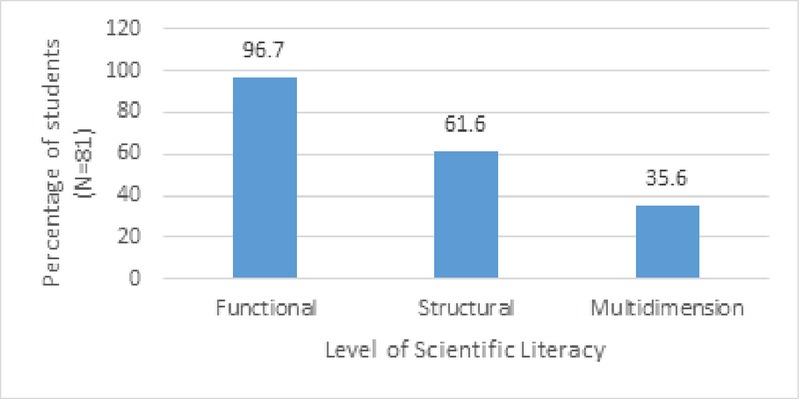Scientific Literacy Of A Third Year Biology Student Teachers: Exploration Study
DOI:
https://doi.org/10.18502/kss.v1i3.747Abstract
The Department of Biology, Universitas Negeri Malang, manages undergraduate courses to prepare prospective teachers of Biology. Biology teachers have to know two important purposes of science education, that is, educating and motivating students to be involved in careers such as scientists and technologists, and providing students with the significant knowledge and understanding of science and social issues to enable them to become informed citizens. This research is conducted to investigate scientific literacy of the third year students of the department. Scientific literacy skill is measured by Multidimensional Literacy Test (MLT), a combination of multiple choice and essay test. The results showed that Scientific Literacy of the third year students is on the level of functional and structural dimension. The result of the interviews with the teachers about the teaching strategies showed that learning scientific writing, which is an important basis scientific literacy development, still needs to be improved. The results of the study can be used as a consideration in selecting and determining appropriate learning strategies to improve the literacy of prospective biology teachers.
Keywords: Scientific literacy, Biology Student Teachers
References
V. L. Akerson, F. Abd-El-Khalick, and N. G. Lederman, “Influence of a reflective explicit activity-based approach on elementary teachers’ conceptions of nature of science,” Journal of Research in Science Teaching, vol. 37, no. 4, pp. 295–317, 2000.
G. E. DeBoer, “Scientific literacy: Another look at its historical and contemporary meanings and its relationship to science education reform,” Journal of Research in Science Teaching, vol. 37, no. 6, pp. 582–601, 2000.
C. Gormally, P. Brickman, and M. Lut, “Developing a test of scientific literacy skills (TOSLS): Measuring undergraduates’ evaluation of scientific information and arguments,” CBE Life Sciences Education, vol. 11, no. 4, pp. 364–377, 2012.
A. Hobson, “Teaching relevant science for scientific literacy,” Journal of College Science Teaching, vol. 30, no. 4, pp. 238–243, 2001.
J. Holbrook and M. Rannikmae, “The meaning of scientific literacy,” International Journal of Environmental and Science Education, vol. 4, no. 3, pp. 275–288, 2009.
S. Rapih, “Pendidikan Literasi Keuangan Pada Anak: Mengapa dan Bagaimana?” Scholaria: Jurnal Pendidikan dan Kebudayaan, vol. 6, no. 2, p. 14, 2016.
L. Ladachart and L. Yuenyong, “Scientific inquiry as a means to develop teachers and supervisors scientific literacy,” vol. 1, pp. 63–76, 2015.
R. C. Laugksch, “Scientific literacy: A conceptual overview,” Science Education, vol. 84, no. 1, pp. 71–94, 2000.
N. G. Lederman, F. Abd-El-Khalick, R. L. Bell, and R. S. Schwartz, “Views of Nature of Science Questionnaire: Toward Valid and Meaningful Assessment of Learners’ Conceptions of Nature of Science,” Journal of Research in Science Teaching, vol. 39, no. 6, pp. 497–521, 2002.
N. G. Lederman, J. S. Lederman, and A. Antink, “Nature of science and scientific inquiry as contexts for the learning of science and achievement of scientific literacy,” vol. 1, pp. 138–147.
NCREL and Metiri Group. (2003). enGauge 21st century skills: Literacy in the Digital age. Napierville, IL. online http://pict.sdsu.edu/engauge21st.pdf.
OECD, (2013). PISA 2015 draft science framework. OECD Publishing.
OECD, (2014). Education at a Glance 2014: OECD Indocators, OECD Publishing.
Partnership for 21st Century Skills, (2011). The intellectual and policy foundations of the 21st century skills framework (n.d.). Retrieved December 19, 2011 from http://route21.p21.org/images/stories/epapers/skills_foundations_final.pdf.
Peraturan Menteri Pendidikan Nasional Republik Indonesia Nomor 23/2006.
Peraturan menteri Pendidikan Nasional Republik Indonesia Nomor 69/2013.
Peraturan Pemerintah Republik Indonesia Nomor 17/2010.
W. Powell and W. K. Snellman, “The knowledge economy,” Annu. Rev. Sociol, pp. 30–199, 2004.
D. S. Rychen, “Key competencies for a successful life and a well functioning society,” in Key competencies for a successful life and a well functioning society, D. S. Rychen and L. H. Salganik, Eds., Hogrefe & Huber, Cambridge, MA, 2003.
K. J. Schönborn and S. Bögeholz, “Knowledge transfer in biology and translation across external representations: Experts’ views and challenges for learning,” International Journal of Science and Mathematics Education, vol. 7, no. 5, pp. 931– 955, 2009.
Y. Shwartz, R. Ben-Zvi, and A. Hofstein, “The use of scientific literacy taxonomy for assessing the development of chemical literacy among high-school students,” Chemistry Education Research and Practice, vol. 7, no. 4, pp. 203–225, 2006.
R. S. Schwartz and A Crawford, “Authentic scientific inquiry as context for teaching nature of science: Identifying critical elements for success,” in Scientific inquiry and nature of science. Implications for teaching, learning, and teacher education, L. B. Flick and N. G. Lederman, Eds., pp. 331–356, Springer, Dordrecht, 2006.
S. Thomson, K. Hillman, and De. L. Bortoli, A teachers guide to PISA scientific literacy, Australian Council for Educational Research Ltd, Victoria, 2013.
C. J. Wenning, “Assessing inquiry skills as a component of scientific literacy,” J. Phys. Tchr. Educ. Online, vol. 4, no. 2, pp. 21–24, 2007.

